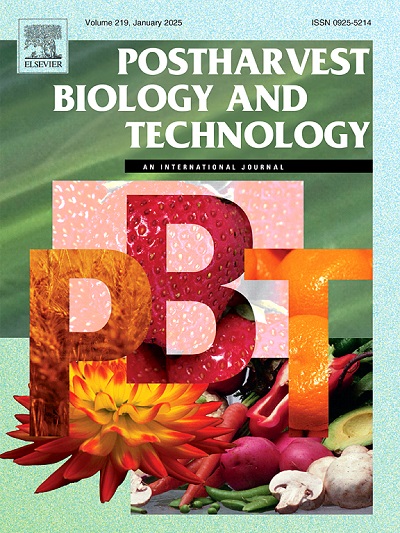迷迭香精油对马铃薯块茎发芽抑制作用的转录组学分析
IF 6.8
1区 农林科学
Q1 AGRONOMY
引用次数: 0
摘要
马铃薯块茎采后发芽危害食品安全,造成经济损失。虽然合成发芽抑制剂已被广泛使用,但对其安全性和环境影响的担忧导致越来越多的限制。因此,需要安全和可持续的植物源替代品,但天然化合物抑制发芽的生理和分子机制仍然知之甚少。本研究考察了迷迭香精油作为天然发芽抑制剂的作用。REO熏蒸延缓发芽,减轻体重,并在100 d内保持营养品质。REO通过下调蔗糖磷酸合酶(SPS)活性,提高蔗糖合酶(SS)和蔗糖转化酶(INV)活性,抑制α-淀粉酶活性,调节蔗糖代谢。为了阐明REO诱导抑制的分子基础,研究人员对储存40 d的块茎进行了转录组学分析。值得注意的是,对照40 d与REO 40 d的比较显示了655个差异表达基因(deg),这些基因丰富于玉米素生物合成、植物激素信号转导和淀粉-蔗糖代谢途径。REO上调糖基转移酶基因(UGT73C3和CISZOG)参与细胞分裂素失活、激活细胞分裂素抑制因子(ARR4和ARR9),并通过调节AUX22D、GH3.5、ERF1和BKI1调节生长素、乙烯和油菜素类固醇信号。同时,REO上调蔗糖降解和糖苷水解相关基因(INV、SS、SS7、BoGH3B、bglB40/46/11和EG6),下调蔗糖合成相关基因(SPS2)和淀粉降解相关基因(amyA3)。这些研究结果表明,REO通过调控植物激素和淀粉-蔗糖代谢途径的基因表达来抑制发芽,突出了其作为一种有效和安全的植物源性发芽抑制剂的潜力。本文章由计算机程序翻译,如有差异,请以英文原文为准。
Transcriptomic analysis of the sprout-suppressive effects of rosemary essential oil on potato tubers
Postharvest sprouting of potato tubers compromises food safety and causes economic losses. Although synthetic sprout suppressants have been widely used, concerns over their safety and environmental impact have led to increasing restrictions. Therefore, safe and sustainable plant-derived alternatives are needed, yet the physiological and molecular mechanisms by which natural compounds inhibit sprouting remain poorly understood. This study investigated rosemary essential oil (REO) as a natural sprouting suppressant. REO fumigation delayed sprout emergence, reduced weight loss, and maintained nutritional quality over 100 d of storage. REO suppressed α-amylase activity and modulated sucrose metabolism by downregulating sucrose phosphate synthase (SPS) while enhancing sucrose synthase (SS) and invertase (INV) activity. To elucidate the molecular basis of REO-induced inhibition, transcriptomic analysis was conducted on tubers stored for 40 d. Notably, the Control 40 d vs. REO 40 d comparison exhibited 655 differentially expressed genes (DEGs), enriched in zeatin biosynthesis, plant hormone signal transduction, and starch-sucrose metabolism pathways. REO upregulated glycosyltransferase genes (UGT73C3 and CISZOG) involved in cytokinin inactivation, activated cytokinin repressors (ARR4 and ARR9), and modulated auxin, ethylene, and brassinosteroid signaling through regulation of AUX22D, GH3.5, ERF1, and BKI1. Concurrently, REO upregulated genes associated with sucrose degradation and glycoside hydrolysis (INV, SS, SS7, BoGH3B, bglB40/46/11, and EG6), while downregulated genes involved in sucrose synthesis (SPS2) and starch degradation (amyA3). These findings suggest that REO suppresses sprouting by regulating gene expression in plant hormone and starch-sucrose metabolism pathways, highlighting its potential as an effective and safe plant-derived sprouting inhibitor.
求助全文
通过发布文献求助,成功后即可免费获取论文全文。
去求助
来源期刊

Postharvest Biology and Technology
农林科学-农艺学
CiteScore
12.00
自引率
11.40%
发文量
309
审稿时长
38 days
期刊介绍:
The journal is devoted exclusively to the publication of original papers, review articles and frontiers articles on biological and technological postharvest research. This includes the areas of postharvest storage, treatments and underpinning mechanisms, quality evaluation, packaging, handling and distribution of fresh horticultural crops including fruit, vegetables, flowers and nuts, but excluding grains, seeds and forages.
Papers reporting novel insights from fundamental and interdisciplinary research will be particularly encouraged. These disciplines include systems biology, bioinformatics, entomology, plant physiology, plant pathology, (bio)chemistry, engineering, modelling, and technologies for nondestructive testing.
Manuscripts on fresh food crops that will be further processed after postharvest storage, or on food processes beyond refrigeration, packaging and minimal processing will not be considered.
 求助内容:
求助内容: 应助结果提醒方式:
应助结果提醒方式:


